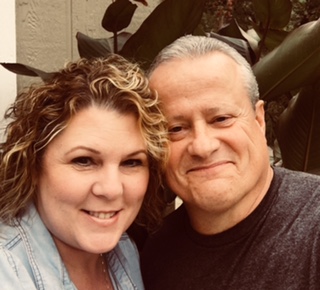October 2023

“I was told to get my affairs in order and quit working,” Christine remembers.
A healthy, active woman of 57 with no previous health issues, she had gone to the doctor with shortness of breath, clavicle, and shoulder pain. After an initial X-ray, she had CT, MRI, and PET scans, which confirmed pleural and cardiac effusion and metasticized adenocarcinoma non-small cell lung cancer, stage 4. “I had cancer in my lungs, liver and brain,” she said. “I was in disbelief because I felt fine, except for shortness of breath when I went up a flight of stairs. I also, immediately thought, OK, I have this – what do we do? What is my game plan? Let’s do this.”
A biopsy confirmed Christine’s cancer carried the ALK mutation – “a game changer,” she said. Lung cancer linked to genetic mutations such as ALK can be treated with targeted therapy drugs. These treatments allow patients to better manage their cancer and have resulted in better survival rates for advanced disease.
“I have been on targeted therapy since the beginning of my ALK positive diagnosis,” Christine said. “I have been on two targeted drugs: alectinib, which got rid of the brain and liver spots, and now lorlatinib.” She has also undergone pulmonary cardiac effusions to drain fluid out of the linings of her lungs and heart.
> Learn more about ALK and other biomarkers here.
‘Cancer is hard’
“I am a naturally hopeful person, but cancer is hard. I think it takes some time to process that you have such a terrible disease. It did for me – it took me a while to wrap my head around me actually being so sick. I have never really been sick; maybe a cold or flu a few times but I was a very busy and active person. I did all the things – mowed, painted houses, played with grandkids, put down sod, built things, gardened – you name it, I have done. it. Everything changes.”
While her cancer is in check, Christine has nonetheless experienced physical fluctuations that have proved challenging. “I gained 70 pounds, have osteoarthritis in joints, concentration levels changed, body swelling (edema). I developed neuropathy in my hands, arms, legs, and feet; thyroid disease; diabetes type 2; and Horner Syndrome (sweating on one side of face, neck and eye drooping). People around you also change in the way they interact with you once you have a diagnosis.”
Strength through support
Christine has found strength through the support of her family, friends, and fellow survivors.
“My husband has been my main source of support and source of hope, along with my children and grandchildren. Staying involved and active with those I love or care about keeps me going.”
In addition, “my cancer support group has been amazing,” she said. “Sarah Bechard is our social worker who leads us and does an amazing job. Just sharing how we LIVE with our diagnosis and treatment together is so important… sharing tips and how – or who – our doctors are, and how to deal with the medical community so they can better help us.”
Christine participates in LCRF’s Lung Cancer Community Facebook group, and attends online events such as #TogetherSeparately educational talks. These activities give her a “sense of power in helping cancer patients now and in the future.”
She also makes sure to enjoy simple pleasures: “Nature. Sunrises, sunsets, swimming, art – painting, writing, quilting – creating. Prayer and meditation.”
Her advice for others diagnosed with lung cancer: “Take one day at a time. Do your own research, ask questions, and remember it’s okay to not be okay. Take time to process. Get into a support group! Go to a counselor. Check out palliative care and what they can do to help with treatment symptoms.”
> LCRF offers information and materials through its support line: (844) 835-4325.
> Join the Lung Cancer Community Facebook group here.
> Other resources and groups are listed on our Quick Links page for patients and caregivers.